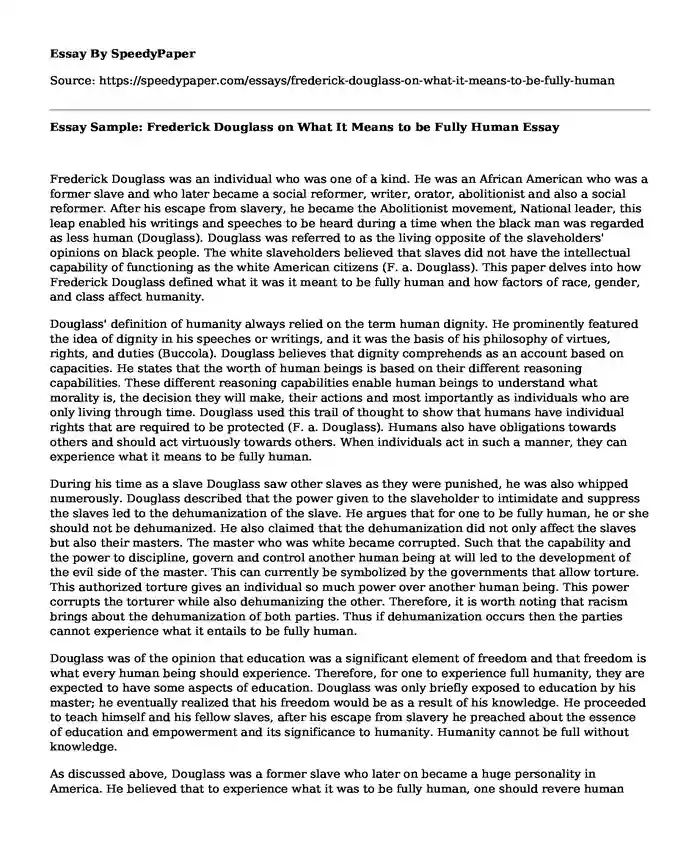Frederick Douglass was an individual who was one of a kind. He was an African American who was a former slave and who later became a social reformer, writer, orator, abolitionist and also a social reformer. After his escape from slavery, he became the Abolitionist movement, National leader, this leap enabled his writings and speeches to be heard during a time when the black man was regarded as less human (Douglass). Douglass was referred to as the living opposite of the slaveholders' opinions on black people. The white slaveholders believed that slaves did not have the intellectual capability of functioning as the white American citizens (F. a. Douglass). This paper delves into how Frederick Douglass defined what it was it meant to be fully human and how factors of race, gender, and class affect humanity.
Douglass' definition of humanity always relied on the term human dignity. He prominently featured the idea of dignity in his speeches or writings, and it was the basis of his philosophy of virtues, rights, and duties (Buccola). Douglass believes that dignity comprehends as an account based on capacities. He states that the worth of human beings is based on their different reasoning capabilities. These different reasoning capabilities enable human beings to understand what morality is, the decision they will make, their actions and most importantly as individuals who are only living through time. Douglass used this trail of thought to show that humans have individual rights that are required to be protected (F. a. Douglass). Humans also have obligations towards others and should act virtuously towards others. When individuals act in such a manner, they can experience what it means to be fully human.
During his time as a slave Douglass saw other slaves as they were punished, he was also whipped numerously. Douglass described that the power given to the slaveholder to intimidate and suppress the slaves led to the dehumanization of the slave. He argues that for one to be fully human, he or she should not be dehumanized. He also claimed that the dehumanization did not only affect the slaves but also their masters. The master who was white became corrupted. Such that the capability and the power to discipline, govern and control another human being at will led to the development of the evil side of the master. This can currently be symbolized by the governments that allow torture. This authorized torture gives an individual so much power over another human being. This power corrupts the torturer while also dehumanizing the other. Therefore, it is worth noting that racism brings about the dehumanization of both parties. Thus if dehumanization occurs then the parties cannot experience what it entails to be fully human.
Douglass was of the opinion that education was a significant element of freedom and that freedom is what every human being should experience. Therefore, for one to experience full humanity, they are expected to have some aspects of education. Douglass was only briefly exposed to education by his master; he eventually realized that his freedom would be as a result of his knowledge. He proceeded to teach himself and his fellow slaves, after his escape from slavery he preached about the essence of education and empowerment and its significance to humanity. Humanity cannot be full without knowledge.
As discussed above, Douglass was a former slave who later on became a huge personality in America. He believed that to experience what it was to be fully human, one should revere human dignity and should also have knowledge. He also believed that racism brought about dehumanization.
Works cited
Buccola, Nicholas. ""The Essential Dignity of Man as Man": Frederick Douglass on Human Dignity." The University of Chicago Press Journal (2015).
Douglass, Frederick, and Harriet A. Jacobs. Narrative of the life of Frederick Douglass, an American slave. Random House Digital, Inc, 2000.
Douglass, Frederick, and Rayford Whittingham Logan. The life and times of Frederick Douglass. Courier Corporation, 2003.
Cite this page
Essay Sample: Frederick Douglass on What It Means to be Fully Human. (2022, Jun 02). Retrieved from https://speedypaper.com/essays/frederick-douglass-on-what-it-means-to-be-fully-human
Request Removal
If you are the original author of this essay and no longer wish to have it published on the SpeedyPaper website, please click below to request its removal:
- Article Analysis Essay Sample: An Unjust Sacrifice
- Essay Example on BSN Nurses and Global Health Issues
- Wellness Theory Essay Example
- Abraham Lincoln and Religion: 1861-1865, Free Essay for Everyone
- Essay Example: 2008 Financial Crisis
- Free Essay Describing Cardiovascular Risks
- Leaves of Grass, Free Essay about Walt Whitman Works
Popular categories





